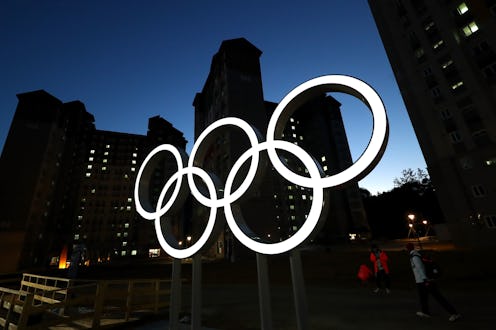Life
This Is How Athletes Can Report Sexual Assault In The Olympic Village

The Winter 2018 Olympics in PyeongChang are well underway, and it's looking to be an exciting season for people who love the Olympics. But as with any high profile sporting event, there is lots of discussion about what resources are available for the safety of everyone staying and working in and around the Olympic Village. As Bustle writer Kyli Rodgriguez-Cayro reported when the Olympics were first beginning, "The history of sexual assault and misconduct happening around and at the Olympics is nothing new." The question, therefore, of how to report a sexual assault at the Olympics, is one that many spectators are keen to know the answer for. And it's a particularly important conversation now, considering that the PyeongChang Games are occurring as #MeToo continues to dominate cultural conversation worldwide.
The International Olympic Committee is explicit in standing against sexual assault of any kind at the Olympics. Its code of ethics includes an article that mandates "rejection of all forms of harassment and abuse, be it physical, professional or sexual, and any physical or mental injuries." All countries participating in the Olympics, including the host countries, have signed onto the IOC Charter that contains this code. However, the IOC doesn't create laws itself. It has a guide for developing safeguarding policies that it distributes to all international sporting federations and National Olympic Committees, but it can only "strongly advise" that the organizations take on the ideas and make their own anti-harassment and assault policies.
Additionally, athletes in an Olympic host country are subject to that country's laws. While they're also subject to punishment from their own countries and Olympic committees, they don't get the option to be given "exceptional treatment." In this context, knowing Korean laws themselves is helpful. Korean laws on rape and sexual assault were overhauled in 2013 to become gender-neutral and expand the definition of rape itself to include non-intercourse sexual violence. While the age of consent is technically 13, according to BUST, sexual assault of anybody under 19 is prosecuted under special laws designed to protect children. There are wider worries, though. South Korean laws on workplace sexual harassment were also strengthened in 2017, but commentators have raised serious questions about the attitude of Korean police towards sexual assault and rape survivors, particularly women; there have been numerous reports of dismissive or harassing behavior by police towards victims, according to Vice.
Everybody in athletic delegations, under the IOC's code, counts as protected by their new safeguarding rules, which were reformulated in 2016 following the incidents in Rio. "Individual competitors (Athletes) and teams, officials, managers and other members of any delegation, referees and jury members and all other accredited persons" are covered by its "Framework For Safeguarding Athletes & Other Participants," which lays out in detail what procedures are in place for reporting harassment and abuse. The Olympic Committee has made it easier to report assault and abuse using multiple channels. One of the biggest innovations? The athlete site for PyeongChang contains a "hotline," an online report form that allows people to confide "violations," anonymously and confidentially, both as survivors or as witnesses to somebody else's assault.
But that won't be the only option available to people who might need to talk. In PyeongChang, all people in the Village will be able to report via the Medical Scientific Commission, the Hotline, the online Olympic Athlete's Hub, and, in a new innovation, an in-person specially trained worker called the IOC Safeguarding Officer. The Framework notes that the Safeguarding Officer isn't the only option to report an assault — you can also talk to the IOC Athlete's Commission or IOC staff who work on-site — but their job was created explicitly to help people in the Village report welfare problems. Once the incident is officially reported, it becomes a matter of disciplinary action, involving local law enforcement, the IOC, and the person's national Olympic Committee.
Hopefully PyeongChang's Winter Games will pass without any harm coming to athletes or staff in the Olympic Village. But it's important that there are multiple safeguards in place to protect survivors. The world will definitely be watching.